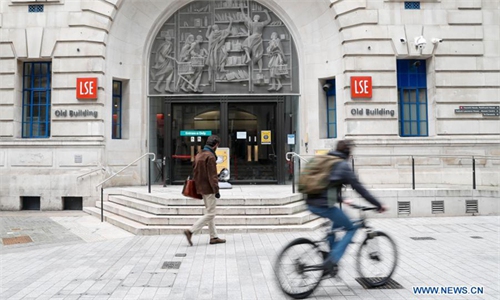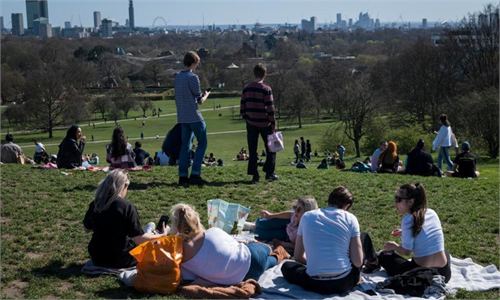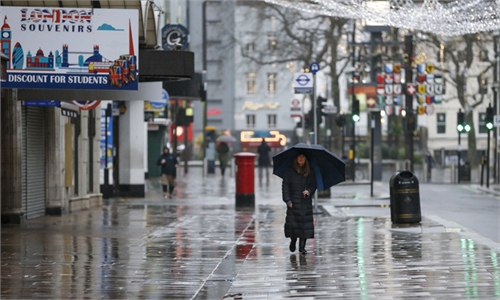
People enjoy sunshine, backdropped by the City of London buildings in London, Britain, June 1, 2021. Britain remains in "a vulnerable position" in fighting coronavirus despite the progress of the country's vaccination program, a scientist advising the British government said Tuesday. Professor Adam Finn from the Joint Committee on Vaccination and Immunisation, which advises the government on vaccine priority, said the job to contain the pandemic is not done as large numbers of people are still unvaccinated.(Photo: Xinhua)
British Prime Minister Boris Johnson on Monday announced a four-week delay to the full lifting of coronavirus restrictions in England due to a surge in infections caused by the Delta variant.The delay comes as a blow to Johnson's plans to fully reopen the UK economy on Monday after months of gradually easing restrictions since March.
Newspapers had been counting down to what had been dubbed "Freedom Day," which was set to mark an end to all social distancing restrictions and the reopening of nightclubs.
But Johnson said a sharp rise in infections had prompted a decision to "ease off the accelerator" and focus instead on ramping up vaccinations.
"On the evidence I can see right now, I'm confident that we will not need more than four weeks and won't need to go beyond July 19," Johnson told a press briefing.
Health policy is devolved in the four nations that make up the UK, handled separately in England, Scotland, Wales and Northern Ireland.
Scotland, which was due to move to the lowest level of restrictions on June 28, is also expected to announce a delay to its reopening.
In England, most current rules - including limits on the number of people who can meet in pubs and restaurants - will remain in place until July 19, although restrictions on the number of guests allowed at weddings will be lifted.
Large-scale pilot events, such as Euro 2020 soccer matches, will also go ahead as planned.
The more transmissible Delta variant, first identified in India, is now responsible for 96 percent of UK cases, and positive tests have jumped 50 percent in the last week.
Total reported cases are now at their highest since February - around 8,000 new infections a day.
The Delta variant is believed to be around 60 percent more transmissible than the Alpha variant first identified in Kent, southeast England.
That strain forced the country to go into another three-month lockdown in January.
Nevertheless, hospital admissions and deaths remain low, thanks in large part to Britain's rapid vaccination rollout.
More than 55 percent of UK adults have had two jabs.
AFP



